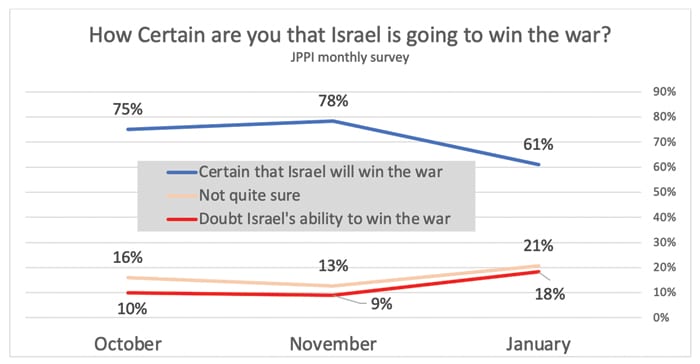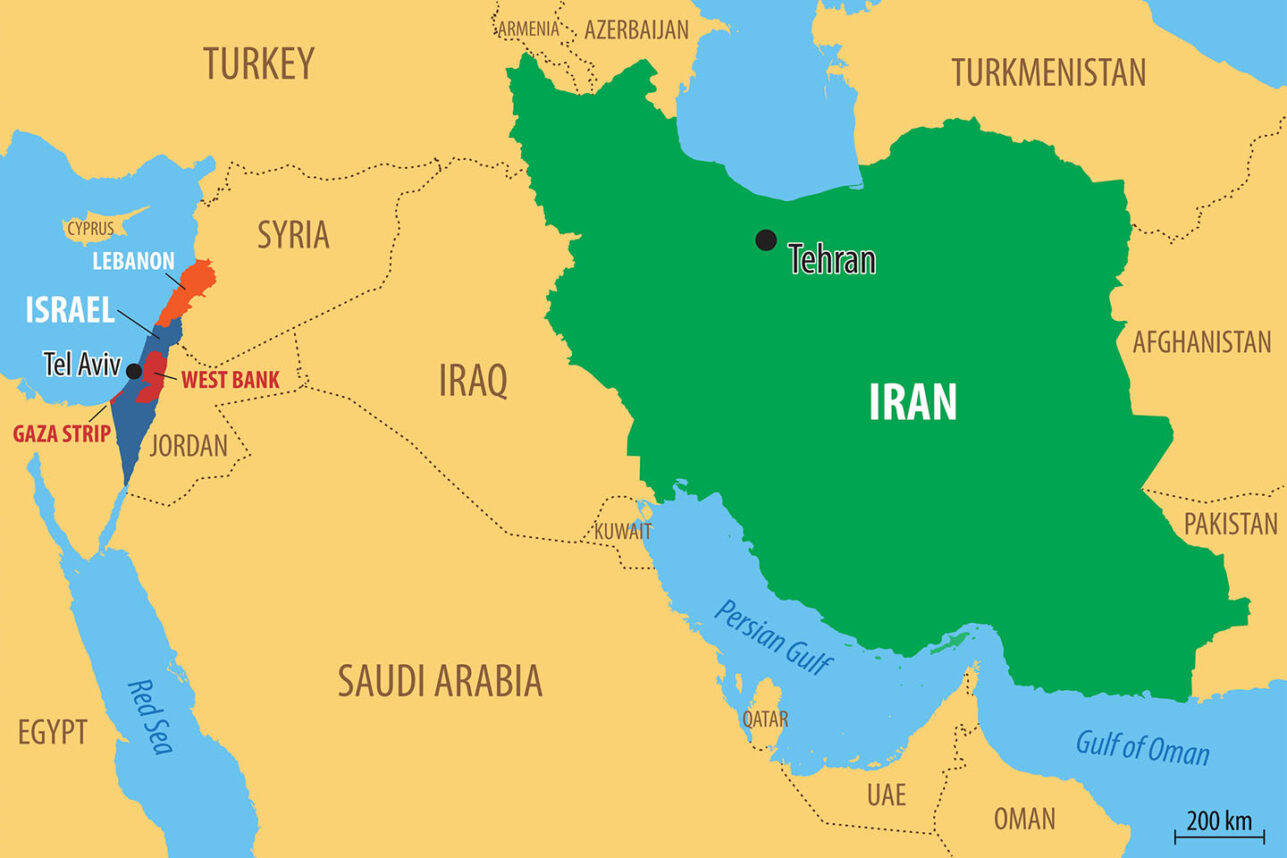
You will not fall off your chair when you see the data. But you should pay attention to its meaning: The lower the trust in Prime Minister Netanyahu, the lower the level of confidence in Israel’s victory in the war. This is a problematic finding, because trust in Netanyahu was low and has not improved. On the other hand, the confidence level of Israeli citizens in victory is decreasing (see graph on the righthand side). It is still high, but clearly eroding. Netanyahu seems to be aware of this. What he said at his press conference last Saturday testifies to his awareness. The IDF chief of staff also seems to be aware of this. The things he said an hour before Netanyahu testify to this. Both made sure to emphasize that Israel is hitting Hamas hard. Both asked for patience, reminding us that a quick victory was never the plan.
I have no way of judging whether Israel is on the way to victory in the campaign. In my estimation, most other commentators who try to assess Israel’s situation are also fishing in the dark. The question of whether Israel is on the way to victory depends on many variables, only some of which it can truly control. The question of whether Israel is on the way to victory also depends on the question of what victory is. And here is one item that may cause concern. One of the things that victory requires is a sense of victory. That is, the very decrease in the confidence of the citizens of Israel that Israel will win erodes Israel’s chance of winning. That’s why the chief of staff asks for patience. That’s why Netanyahu hammers the pundits who focus on the mounting difficulties.
The public believes the chief of staff. For three months now, since the beginning of the war, polls by JPPI show that the public trusts the military’s high command. Beyond slight fluctuations, trust in the high command remains roughly the same as it was when the war started. So, when the Chief of Staff says that the campaign is progressing well, he might have the ability to convince the public that Israel is on its path to victory. The PM has no such ability. Not because the facts he presents are different, but because the level of trust in Netanyahu is low. When the war started trust in him was low, and the war itself did not change his situation one iota. It seems as if those who have lost trust in Netanyahu are already deaf to what he says. They are blind to his rhetoric. The percentage of those who trusted Netanyahu in October, shortly after the start of the war, was 32%. In November it decreased to 30%, in January it increased to 34%. These are not changes. These are natural oscillations of the sample.
Why has the confidence of Israeli citizens that Israel will win gone down? First, because time is passing and victory is not yet in sight. Patience is a necessary commodity, but it’s a rare one too. Every day without victory is another day of news about dead and wounded soldiers, about hostages who have not yet returned, about demonstrations, about heartbreak. Every day in which there is no victory is a day of petty political fights, of wading in muddy waters, of Israeli evacuees who do not return to their homes, of rockets in the north, of discussions in The Hague.
This is all news that erodes the confidence in victory, regardless of the question of what the IDF forces are achieving in the alleys of the Gaza Strip. If tomorrow the soldiers suddenly find and rescue the hostages, or find and kill the main leaders of Hamas — the picture will likely be reversed. But until there’s good news, there is mostly bad news. And indeed, in the face of bad news, patience is required. Determination and seriousness are required. A leadership that the public can trust is required.
Netanyahu and his supporters will say, quite rightly, that pundits in TV studios rush to celebrate imaginary victories (in this they are similar to politicians), and rush to announce imaginary failures (in this they irritate the politicians). Netanyahu and his supporters will say, quite rightly, that Israel must show determination, and refrain from desperation.
In World War II, Winston Churchill maintained high morale in Britain for many months of mostly bad news. Netanyahu was never a Churchill, and even if he was, he is no longer it. He did not enter the war like Churchill, as someone who came to save his people. He entered the war with a significant part of the public believing that his people must be saved from him. Thus, his ability to maintain high morale is limited. And it shows.
Something I wrote in Hebrew
Amid the discussion of the must-win situation vs. the demand not to harm uninvolved citizens in Gaza I wrote this:
There are many reasons to protect the innocent. There are moral reasons — because the innocent are innocent. There are social reasons — because a society that loses its moral compass is a lesser society. There are political reasons — because Israel needs allies for whom it is important to make sure that Israel is a country whose values are similar to their own. There are operational reasons — a moment’s hesitation before pulling the trigger prevents injury to innocents, and prevents our forces from harming their peers. Bottom line: Life is a pendulum, and principles also swing with it. Israel must fight to win. But the way to victory is also important. Do whatever it takes to win. Don’t do anything that’s not essential for winning.
A week’s numbers
Most Jewish Israelis still believe that victory is within reach, but the share of such believers is worryingly declining.

A reader’s response:
Herb Levin writes: “I just wanted to say that it’s important to repeatedly highlight the bravery and dedication of Israel’s soldiers. Their sacrifice must be always on our minds”.
Shmuel Rosner is senior political editor. For more analysis of Israeli and international politics, visit Rosner’s Domain at jewishjournal.com/rosnersdomain.


































 More news and opinions than at a Shabbat dinner, right in your inbox.
More news and opinions than at a Shabbat dinner, right in your inbox.